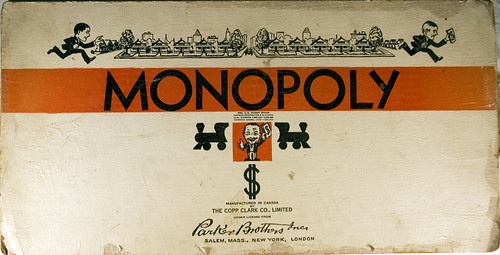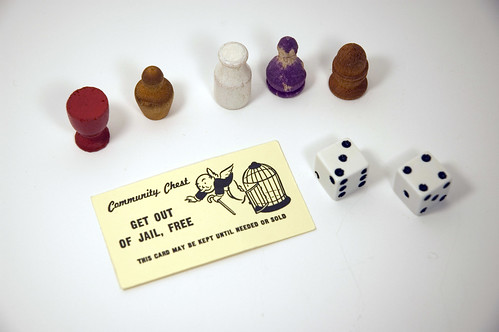I occasionally get into a streak where I love playing board games and my absolute favorite game to play on a cold autumn afternoon is Parker-Brother’s classic real estate trading game, Monopoly. I played yesterday with my family and though at some points it was give or take whether I would pull through, in the end, I won it all!
Disappointed by the lack of good strategy guides in a cursory search for “monopoly strategy”, I’m convinced there is a definite need for someone to get the good information out there, so I’ll do what I can in my limited knowledge.
Some interesting facts and lesser known rules about Monopoly:
- It usually takes five turns (but 6 rolls – you’ll probably roll doubles once) to go around the board. You’ll probably land on four of the 28 property spaces.
- If one or both dice roll off the board, or land on or lean against a card deck, the roll is invalid. Roll them again.
- The most landed on spaces are: Jail, Illinois Avenue, GO and the B.&O. Railroad.
- Free parking does not entitle a player to any kind of monetary reward. Free parking is a free space with no other penalty or reward.
- As a general rule, when you land on “Income Tax” pay 10% if you haven’t yet been around the board three times. You will average a net gain of $170 every time you pass Go (at least early in the game) and you start with $1500. Therefore it’s in your best interest to do the math and figure out if you have less than $2000 worth of assets.
- Pay $50 and get out off Jail early in the game while many properties remain unowned and undeveloped. You need to be in circulation so that you can buy up those properties. Later in the game it may be better to rest in jail free from expensive rent payments but still able to collect.
- If a player does not wish to buy an unowned property he or she has landed on it is sold at auction by the Banker to the highest bidder. Any player, including the one who declined the option of buying it at the printed price, may bid. Bidding may start at any price.
To finish off this post, I’ve got a question that doesn’t appear to be answered in the rule book. Perhaps some of the more clever readers here will enlighten us with their opinions in the comments. It’s a fact that, if the owner of a property fails to ask for his/her rent before the second player following the one who landed on the property throws the dice, the debt is uncollectible.
My question is:
What if the player who landed on the property had rolled doubles and the owner fails to ask for his/her rent? Can the same player quickly pick up the dice and roll again? or does that only work when a second player picks up the dice and rolls?

